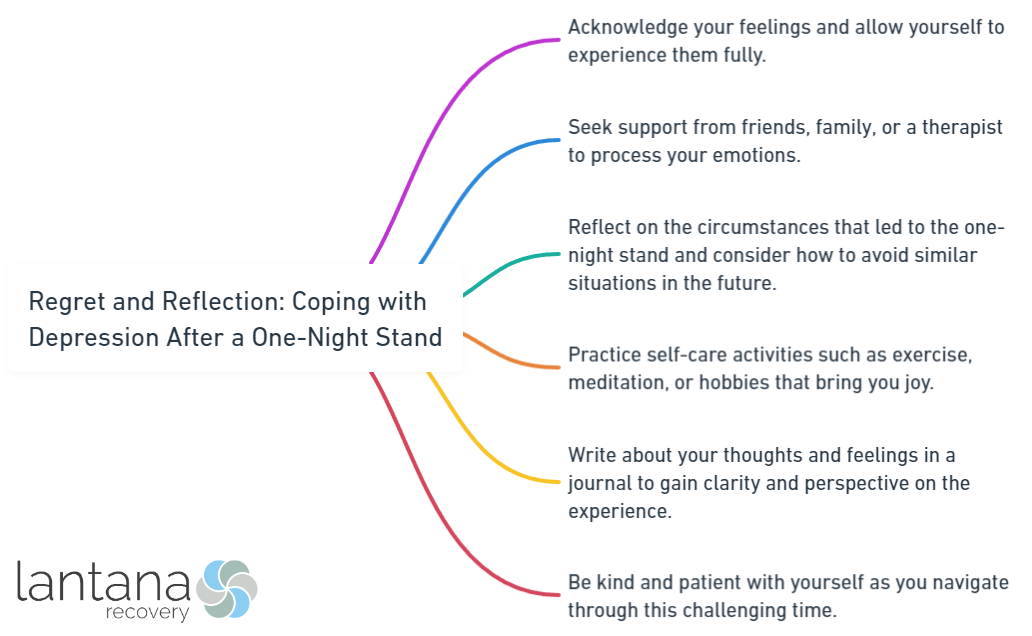Coping with the emotional aftermath of a one-night stand can be a challenging experience, often leading to feelings of regret and the need for deep reflection. Many individuals feel bad, experiencing regret and disappointment about their actions. Understanding these complex emotions and their impact on mental health is crucial to finding effective coping strategies.
Regret, as a powerful emotion, arises when one feels a sense of disappointment, remorse, or dissatisfaction about a past decision or action. On the other hand, reflection involves introspection and thoughtful consideration of one’s experiences, actions, and choices. Together, these emotions play a significant role in the aftermath of a one-night stand, influencing the psychological well-being of individuals involved. Some may feel horrible dealing with the aftermath, grappling with negative emotions and the need to come to terms with the experience.
A one-night stand can have a profound psychological impact, particularly in the context of depression and other mental health challenges. It can amplify feelings of loneliness, shame, and emptiness, leading to a sense of detachment and low self-worth. Factors contributing to depression after a one-night stand may include societal norms, personal values, and unmet emotional needs.
To cope with depression after a one-night stand, there are various strategies that individuals can implement. Seeking support from loved ones provides a space for open communication and understanding, helping to alleviate feelings of isolation. Engaging in self-care activities such as exercise, mindfulness, and creative outlets can promote emotional healing and self-compassion. Exploring therapy and counseling options is also valuable, as professionals can provide guidance and therapeutic interventions tailored to individual needs.
Developing a healthy relationship with regret and reflection is essential in the journey towards healing and personal growth. Accepting and learning from mistakes is a vital step in moving forward, allowing individuals to forgive themselves and embrace self-forgiveness. Furthermore, using regret and reflection as tools for growth empowers individuals to make healthier choices in the future, cultivate self-awareness, and foster personal development.
By understanding the emotions of regret and reflection, acknowledging the psychological impact of a one-night stand, implementing coping strategies, and developing a healthy relationship with these emotions, individuals can better navigate the complexities of coping with depression after a one-night stand. Remember, seeking professional help and support is crucial in this journey towards healing and well-being.

Understanding Regret and Reflection
Understanding regret and reflection is essential when dealing with the aftermath of a one-night stand. It is crucial to acknowledge and process these emotions in order to move forward in a healthy way.
- Recognizing the feelings: It is normal to experience regret and feel guilty after a one-night stand. This emotion can arise from various factors such as expectations, vulnerability, or the violation of personal values. Reflection involves engaging in introspection and gaining a deeper understanding of one’s actions.
- Acknowledging personal responsibility: It is important to take ownership of your choices and actions without excessively blaming yourself. It is essential to recognize that everyone makes mistakes and that there is an opportunity to learn from them. Some may feel ashamed due to societal expectations and personal values, which can lead to negative emotions and regret.
- Seeking support: It can be helpful to confide in a trusted friend or therapist to express your emotions and gain perspective. Sharing experiences can assist in navigating feelings of regret and reflection.
- Learning and growing: Use this experience as an opportunity to reflect on personal boundaries, values, and desires. Gain a better understanding of what you want from future romantic encounters and establish clear expectations.
- Taking time for self-care: Engage in activities that promote self-care and well-being, such as exercise, mindfulness, hobbies, or spending quality time with loved ones.
Pro-tip: Remember that regrets and reflections are an integral part of personal growth. Be kind to yourself and allow yourself time and space to heal and move forward.
What is Regret?
Regret, defined as the powerful emotion experienced when we feel dissatisfaction or remorse about something we have done or failed to do, greatly impacts our mental well-being. Taking the time to reflect on our choices or actions can often result in regret, especially when we believe that we have made a mistake or missed out on an opportunity.
It’s crucial to understand that regret goes beyond simply feeling sorry for oneself. It involves engaging in self-criticism and self-blame, which can lead to experiencing emotions such as guilt, shame, and even depression.
When we take the time to comprehend and acknowledge regret, we are better equipped to navigate its complexities. It is important to recognize that regret is a natural part of the human experience and serves as an indication of our conscience and desire for personal growth and improvement. However, it is crucial to strike a balance because overly fixating on regret can hinder our ability to move forward and learn from our mistakes.
In order to effectively manage regret, it is beneficial to identify the underlying causes that contribute to it. For example, lack of knowledge or acting impulsively are common factors that can lead to regretful outcomes. By gaining a deep understanding of these causes, we can make more informed decisions and choices that will lead to a future with fewer regrets.
What is Reflection?
Reflection is the process of contemplating one’s thoughts, actions, and experiences. It involves evaluating beliefs, values, and decisions to gain insight and understanding. Through reflection, individuals can gain self-awareness and self-knowledge. It helps understand strengths, weaknesses, and areas for improvement. Reflection promotes critical thinking and deepens understanding of oneself and others.
In the context of regret and reflection after a one-night stand, reflection is a powerful tool for coping and healing. By reflecting, individuals gain insight into emotions, motivations, and decision-making. They can explore negative feelings or regrets and learn from their mistakes.
Reflection helps develop a healthier relationship with regret. Instead of dwelling on past actions and feeling overwhelmed, reflection empowers individuals to use experiences for growth. By reflecting on choices, behaviors, and emotions, individuals can cultivate resilience, self-awareness, and personal growth.

The Psychological Impact of a One-Night Stand
The psychological impact of a one-night stand can have varied effects on individuals. Experiencing a first one night stand can evoke unique emotional responses such as sadness, confusion, and self-reflection. Regret, guilt, or confusion may arise as emotional responses. These feelings can be influenced by societal expectations, personal values, or a loss of control.
Engaging in a one-night stand can affect self-esteem. Some individuals may feel empowered and confident, while others may question their self-worth or experience shame. For those in committed relationships, a one-night stand may result in feelings of guilt, betrayal, or damage to trust.
While some view a one-night stand as an opportunity for personal growth, exploring desires, boundaries, and preferences, it’s important to acknowledge that the psychological impact of such an experience can be long-lasting. This impact can be even more significant if it conflicts with personal values or is perceived as negative. It may lead to re-evaluating choices and decisions in future sexual encounters.
It’s crucial to note that the psychological impact of a one-night stand is subjective and can vary greatly from person to person. Prioritizing open communication, self-reflection, and self-care is essential for navigating the aftermath of such an experience as is addressing mental health challenges in immobility, for example.
How Does a One-Night Stand Impact Mental Health?
A one-night stand can have a significant influence on a person’s mental well-being. It is crucial to understand the psychological effects that can arise from this encounter. Primarily, engaging in casual sex without emotional connection or commitment can lead to regret, guilt, and shame. The next morning, individuals might experience a shift in emotions and thoughts, often leading to feelings of regret and shame. Individuals may feel empty and question their choices when there is a lack of emotional intimacy and connection. This can contribute to feelings of loneliness and sadness.
Furthermore, a one-night stand can elevate the risk of depression. Studies indicate that individuals in casual sexual relationships are more prone to experiencing symptoms of depression compared to those in committed relationships. This could be attributed to a sense of emptiness or the adverse impact on self-esteem.
The psychological impact of a one-night stand can be intensified by personal values, cultural beliefs, and past experiences. Those who place importance on emotional connections, intimacy, and long-term commitment may be more vulnerable to negative emotions after engaging in a one-night stand.
It is worth noting that individuals may have different responses to a one-night stand. While some may feel empowered and satisfied, others may encounter negative emotions. The impact on mental health may vary depending on individual experiences and circumstances.
Factors Contributing to Depression After a One-Night Stand
Engaging in a one-night stand can lead to depression. Factors contributing to depression after a one-night stand include:
- Emotional Attachment: The expectation of ‘no strings attached’ can result in the absence of an emotional connection, leaving individuals feeling empty and unfulfilled, which can lead to depressive symptoms.
- Loss of Self-Worth: A one-night stand can diminish one’s self-worth and make individuals feel used, intensifying negative emotions and contributing to depression.
- Regret and Guilt: Feelings of regret and guilt are common after a one-night stand, particularly when it conflicts with personal values or beliefs. These negative emotions can trigger depressive thoughts and feelings.
- Loneliness and Isolation: Engaging in casual sexual encounters without forming deeper connections can result in feelings of loneliness and isolation. These feelings of disconnection can contribute to depression.
- Negative Social Reactions: Society still often stigmatizes casual sexual encounters, leading to negative social reactions. Facing judgment and criticism from others can increase the risk of depression after a one-night stand.
It is important to acknowledge that these factors do not impact everyone in the same manner, and individual experiences may differ. However, understanding these potential factors can assist individuals in managing their emotions and seeking appropriate support if needed.

Coping Strategies for Dealing with Depression After a One-Night Stand
Navigating the emotional aftermath of a one-night stand can be challenging, especially when it triggers feelings of depression. Stop feeling guilty and make proactive choices to overcome these negative emotions. In this section, we’ll delve into effective coping strategies that can help you find solace and healing in such situations. From seeking support from loved ones to engaging in self-care activities, and exploring therapy and counseling options, we’ll uncover practical approaches to regain your emotional well-being and overcome the shadows of regret. It’s time to embark on a journey of self-discovery and embrace strategies that will empower you to turn adversity into growth.
Seeking Support from Loved Ones
Seeking support from loved ones is a crucial step towards emotional healing and overall well-being after dealing with depression following a one-night stand. Loved ones can play a significant role by providing the necessary support through various means.
One way is by simply listening. They can create a safe space where individuals can freely express their feelings without any fear of judgment. Another way is through understanding. Validating the individual’s feelings and empathizing with their struggles can make a world of difference. Additionally, offering words of encouragement and reminding the person of their worth can be incredibly uplifting.
Loved ones can also provide practical help by assisting with finding therapy options, attending appointments, or even helping with everyday tasks. Furthermore, they can emphasize the importance of self-care activities such as exercise, mindfulness, hobbies, or spending time in nature. These activities can greatly contribute to the healing process.
However, it is important to acknowledge that seeking professional help may be necessary for more severe cases of depression. Encouraging your loved ones to seek therapy or counseling is essential, as trained professionals from Lantana can provide specialized support and guidance.
Engaging in Self-Care Activities
Engaging in self-care activities is crucial for individuals coping with depression after a one-night stand. These activities can promote emotional well-being and aid in the healing process. Here are some self-care activities to consider:
1. Practice mindfulness: Engage in mindfulness exercises like meditation or deep breathing to calm the mind and reduce anxiety.
2. Engage in physical activity: Regular exercise boosts mood and reduces depression symptoms. Try activities like walking, yoga, or participating in a favorite sport.
3. Prioritize self-care routines: Take care of yourself by doing activities that bring joy and relaxation, like taking a warm bath, reading a book, or listening to calming music.
4. Connect with loved ones: Surround yourself with a support system of trusted friends or family members to talk about your feelings.
5. Engage in hobbies: Dedicate time to activities you enjoy for a positive distraction and a sense of accomplishment.
6. Cultivate a balanced diet: Eat nutritious foods rich in vitamins and minerals to support brain health and enhance mood.
7. Get enough sleep: Establish a regular sleep routine and prioritize quality sleep to maintain emotional well-being.
8. Seek professional help if needed: If depression feelings persist or become overwhelming, seek therapy or counseling for valuable support and guidance.
Engaging in these self-care activities can help individuals cope with the emotional aftermath of a one-night stand and promote healing and well-being.
Exploring Therapy and Counseling Options
Exploring therapy and counseling options is a proactive step towards healing and coping with depression after a one-night stand. Therapy provides a supportive space to process emotions, while counseling offers guidance and coping strategies.
1. Individual therapy: Meeting one-on-one with a therapist allows for a personalized approach. Therapists help individuals explore the reasons behind depression and provide effective techniques for managing emotions. Expect open and honest conversations to gain insight and develop healthier coping mechanisms.
2. Group therapy: Joining a therapy session with others who have had similar experiences provides a sense of belonging and support. Group therapy allows for sharing experiences, validation, and learning from others who have coped successfully. Confessions of depression and breaking the silence can be life-changing.
3. Cognitive-behavioral therapy (CBT): CBT is a common approach that focuses on identifying negative thought patterns and replacing them with positive and adaptive ones. It helps challenge unhelpful beliefs related to the one-night stand and depression, teaching skills to manage emotions and improve well-being.
4. Online counseling: Online platforms offer access to licensed therapists through video calls or messaging, providing flexibility and convenience for those who prefer it or have limited access to in-person therapy.
Seeking professional help and exploring therapy and counseling options is a sign of strength. Remember, resources are available to support individuals on their journey towards mental well-being.

Developing a Healthy Relationship with Regret and Reflection
Developing a healthy relationship with regret and reflection can be a powerful tool for personal growth. Even if a one-night stand didn’t lead to a relationship, it’s important to acknowledge that you had great sex and a positive experience. In this section, we will explore two key aspects: accepting and learning from mistakes, and utilizing regret and reflection as a catalyst for positive change. By understanding how to navigate these realms, we can transform regret into valuable lessons and shape a brighter future. So, let’s dive in and uncover the transformative power of embracing our past experiences.
Accepting and Learning from Mistakes
To develop a healthy relationship with regret and reflection, focus on accepting and learning from mistakes.
1. Recognize the mistake: Acknowledge and admit the mistake. Avoid denying or ignoring it, as this hinders learning and growth.
2. Take responsibility: Accept accountability for the mistake. Everyone makes mistakes, so own up to them instead of shifting blame onto others.
3. Identify the lesson: Reflect on the mistake and examine what went wrong. Look for patterns or recurring behaviors that led to the error. This helps in learning valuable lessons to avoid similar mistakes in the future.
4. Learn from experience: Use the mistake as an opportunity for growth and improvement. Consider how it can shape future decision-making processes and actions. This helps in developing resilience and avoiding similar errors.
5. Practice self-compassion: Be gentle with yourself when accepting and learning from mistakes. Understand that making mistakes is natural, and it is through these experiences that personal growth occurs.
By embracing mistakes and using them as learning opportunities, individuals can cultivate a healthy mindset towards regret and reflection. This approach fosters personal development and helps in making better choices in the future.
Using Regret and Reflection as a Tool for Growth
Using regret and reflection as a tool for growth can help individuals learn from past experiences and make positive changes. To effectively utilize regret and reflection, it is important to analyze the situation that led to regret and identify the lessons that can be learned from it. This involves understanding underlying emotions and behaviors, recognizing patterns or triggers, and making necessary adjustments to prevent similar regrets in the future.
Setting goals based on the lessons learned is another way to use regret and reflection for growth. By taking proactive steps and implementing positive changes, individuals can avoid repeating past mistakes. For example, if a one-night stand led to feelings of emptiness and regret, setting boundaries and prioritizing emotional connections in future relationships can contribute to personal growth.
It is important to remember that growth takes time and effort. Approaching regret and reflection with a growth mindset is crucial. This means being open to learning, accepting mistakes as part of the learning process, and being willing to make changes for personal improvement. Reach out to outpatient centers like Lantana Recovery for expert help as needed.
True Story: Steve Jobs is an example of using regret and reflection as a tool for growth. After being fired from Apple, the company he co-founded, Jobs reflected on his mistakes and areas for improvement. This period of reflection led to personal growth and a shift in his approach to leadership and innovation. Jobs went on to found NeXT Inc., a computer company that was later acquired by Apple, leading to his return to the company and a transformation in its success. This experience taught Jobs the importance of perseverance, creativity, and partnerships, which he applied throughout the rest of his career. By using regret and reflection as a tool for growth, Jobs turned a setback into an opportunity, leaving a lasting impact on the technology industry.
How can I cope with feelings of regret and depression after a one-night stand?
Regret and depression are common emotions after a one-night stand, often referred to as the ‘walk of shame,’ where feelings of shame and guilt are experienced the next day. To cope with these feelings, try engaging in self-reflection and asking yourself what kind of relationship you want with sexual partners. It may be helpful to talk to a trusted friend or mental health professional and consider their guidance. Boosting your self-esteem, pursuing hobbies, practicing relaxation techniques, and engaging in physical activity can also be beneficial. If your feelings persist, seeking professional help and considering safer sex practices for future encounters may be necessary.
Are men also prone to experiencing regret and depression after a one-night stand?
Yes, both men and women can experience similar emotions after casual sexual encounters. It is not uncommon for men to feel regret, sadness, or other negative emotions after a one-night stand. These emotions can vary depending on the individual and the specific circumstances of the encounter.
What are some potential reasons why women regret one-night stands?
Women may have various reasons for regretting one-night stands. Some common reasons include compromising personal values, feeling emotional attachment or loss of control, fearing the negative impact on friendships, longing for more information about the person, and experiencing shame or guilt due to cultural or societal norms. Additionally, some women engage in one-night stands as a way to escape sadness or depression but may end up feeling even more shame afterward.
How can individuals minimize regret and reflection after a one-night stand?
To minimize regret and reflection after a one-night stand, it may be helpful to divert your mind, avoid wasting time on regret, confront any questions or emotions you may have, and consider apologizing if necessary. Recognize that dwelling on your actions can be counterproductive and focus on moving forward rather than dwelling on the past.
What role can seeking professional help play in coping with regret and depression after a one-night stand?
Seeking the guidance of mental health professionals, such as psychologists, psychiatrists, or therapists, can provide valuable support in coping with regret and depression after a one-night stand. These professionals can help you process your emotions, explore underlying issues, and develop strategies to improve your emotional well-being. They can also guide you in making healthier sexual choices and provide support for any related concerns, such as sexual health or relationship issues.
Is it normal to experience feelings of regret and depression after a one-night stand?
Yes, it is normal to experience feelings of regret and depression after a one-night stand. Casual sex experiences can evoke a range of emotions, and not all encounters are devoid of emotional attachment. Each person’s response can vary depending on their own values, beliefs, and experiences. It is important to acknowledge and validate these emotions, while also seeking support and engaging in self-care to promote emotional healing and growth.









